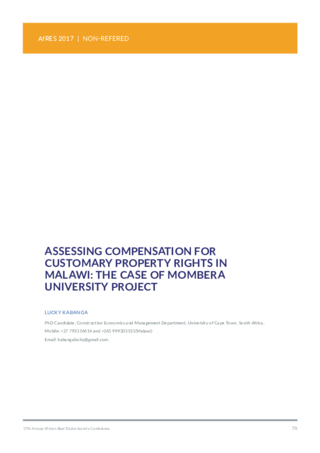Provision of public facilities and infrastructure in various sectors such as agriculture, mining, transport, education, and health among others requires a lot of land, which government usually expropriates as it may not have the appropriate land, or in appropriate quantities, or in appropriate locations. Compensation is normally required to cover consequential expropriatory losses occasioned to expropriated people. This paper aims to deepen our understanding of the applicability of market value as a basis for valuing customary property rights for compensation purposes during expropriation. By using the case of Mombera University project, this paper analyses how compensation is valued for customary property rights that are dominant in Malawi. The paper demonstrates that practically compensation for expropriating customary properties is generally inappropriate because market value, as a compensation valuation basis, and the methods used for its determination, are ill-equipped for customary properties. In this regard, the paper argues that prevailing assessment practices lead to inappropriate compensation for customary property rights in Malawi.
Kabanga, Lucky. "ASSESSING COMPENSATION FOR CUSTOMARY PROPERTY RIGHTS IN MALAWI: THE CASE OF MOMBERA UNIVERSITY PROJECT." In 17th Annual African Real Estate Society Conference, 70-82. AfRES. Johannesburg, South Africa: African Real Estate Society, 2017.
Refereed Designation: Non-Refereed
